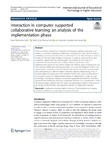Mostrar o rexistro simple do ítem
Interaction in Computer Supported Collaborative Learning: An Analysis of the Implementation Phase
| dc.contributor.author | Hernández-Sellés, Núria | |
| dc.contributor.author | Muñoz-Carril, Pablo-César | |
| dc.contributor.author | González-Sanmamed, Mercedes | |
| dc.date.accessioned | 2020-07-21T12:16:48Z | |
| dc.date.available | 2020-07-21T12:16:48Z | |
| dc.date.issued | 2020 | |
| dc.identifier.citation | Hernández-Sellés, N., Muñoz-Carril, P. & González-Sanmamed, M. Interaction in computer supported collaborative learning: an analysis of the implementation phase. Int J Educ Technol High Educ 17, 23 (2020). https://doi.org/10.1186/s41239-020-00202-5 | es_ES |
| dc.identifier.uri | http://hdl.handle.net/2183/26044 | |
| dc.description.abstract | [Abstract] There is extensive research on interaction frameworks in distance education and studies in Computer Supported Collaborative Learning (CSCL) have also focused on establishing interaction models. There is still research to be done, though, in order to identify the elements that configure interaction to build up a framework for their integration, aligned with the learning goals. The purpose of this study is to understand the key elements that configure effective interaction in the implementation phase of CSCL and to analyze the different types of interactions that occur during collaborative learning processes. The study was designed under a nonexperimental quantitative methodology and 106 learners answered a questionnaire after participating in 5 different higher education subjects implementing CSCL. A factorial analysis of results prove that students identify three types of interaction to be necessary during the implementation phase of collaboration in order to reach knowledge convergence: cognitive, social and organizational interaction. Therefore, instructors and institutions who wish to promote effective CSCL should bear in mind the learning goals together with the social and organizational aspects interwoven in the design, implementation and assessment phases of collaborative learning. | es_ES |
| dc.description.sponsorship | This paper has been written in the context of the research project: “Ecologías de aprendizaje en la era digital: nuevas oportunidades para la formación del profesorado de educación secundaria” (ECO4LEARN-SE) “Learning ecologies in the digital era: new opportunities for teacher training in secondary education”. It has been partially financed by the Ministry of Science, Innovation and Universities in Spain, (Ref. RTI2018–095690-B-I00) | es_ES |
| dc.language.iso | eng | es_ES |
| dc.relation | info:eu-repo/grantAgreement/AEI/Plan Estatal de Investigación Científica y Técnica y de Innovación 2017-2020/RTI2018-095690-B-I00/ES/ECOLOGIAS DE APRENDIZAJE EN LA ERA DIGITAL: NUEVAS OPORTUNIDADES PARA LA FORMACION DEL PROFESORADO DE EDUCACION SECUNDARIA/ | |
| dc.relation.uri | https://doi.org/10.1186/s41239-020-00202-5 | es_ES |
| dc.rights | Atribución 4.0 Internacional | es_ES |
| dc.rights.uri | http://creativecommons.org/licenses/by/4.0/ | * |
| dc.subject | Collaborative learning | es_ES |
| dc.subject | Higher education | es_ES |
| dc.subject | Teaching/learning strategies | es_ES |
| dc.subject | Computer-mediated communication | es_ES |
| dc.subject | Interactive learning | es_ES |
| dc.title | Interaction in Computer Supported Collaborative Learning: An Analysis of the Implementation Phase | es_ES |
| dc.type | info:eu-repo/semantics/article | es_ES |
| dc.rights.access | info:eu-repo/semantics/openAccess | es_ES |
| UDC.journalTitle | International Journal of Educational Technology in Higher Education | es_ES |
| UDC.volume | 17 | es_ES |
| UDC.issue | 23 | es_ES |
| dc.identifier.doi | 10.1186/s41239-020-00202-5 |
Ficheiros no ítem
Este ítem aparece na(s) seguinte(s) colección(s)
-
GI-EIRA - Artigos [30]






